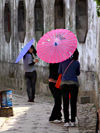|
rom (ร่ม)
Thai for ‘parasol’ or ‘umbrella’. In the Orient, umbrellas are believed
to have originated in ancient
China, probably as long ago as 2,500 years, and
were initially designed to be mounted on carts and chariots (fig.).
In Chinese, umbrellas and parasols are both known as san (伞), though the
parasol can be specified by referring to it as yangsan (阳伞), which could
be translated as ‘sun umbrella’, i.e. a ‘parasol’. In Thai, the word
rom also
means ‘shade’, i.e. a sunshade or parasol, but umbrellas and
parasols for royalty and priests are called
klot (fig.),
whereas multi-layered umbrellas held over honorary figures are called
chattra
(fig.).
In northern Thailand
rom thong, i.e.
‘golden parasols’, are very popular, used both as decorative items (fig.)
and as symbols in
Lan Na-style
festivals (fig.).
Though also cotton is
becoming increasingly popular, in
Thailand and
Myanmar
parasols are traditionally produced from
sah-paper
and
silk on
a skeleton made of
bamboo
and wood. They are usually painted,
frequently
with elaborate designs (fig.),
especially when made in Bo Sang, a village in San Kamphaeng, near
Chiang Mai. The
parasol is one of the
Ashtamangala
(fig.),
eight auspicious symbols,
as well as one of the eight
borikaan,
i.e. the permitted possessions of
Buddhist monks.
In Thailand, the Burmese monk
Shin Thiwali
(fig.)
is referred to as
Phra Siwalih
and is typically depicted carrying a closed
klot
(fig.)
over his shoulder,
whilst
U Shwe Yo, a Burmese comical character
(fig.),
is usually depicted holding a small hand-painted parasol called
Pathein (fig.).
Besides this, certain Buddhist offerings in Myanmar and northern
Thailand use miniature paper parasols called
hti
(fig.),
and in
both
Mahayana
and
Vajrayana
Buddhism,
the ferocious goddess
Ushnisha Sitatapatra
has a white umbrella, known in
Sanskrit
as
Sitatapatra, as her
attribute
(fig.).
See also POSTAGE STAMPS (1)
and
(2),
TRAVEL PICTURES (1) and
(2),
THEMATIC STREET LIGHT,
WATCH VIDEO (1)
and
(2),
VIDEO (M),
and
VIDEO (EN - 1)
and
(EN - 2).
回






|

